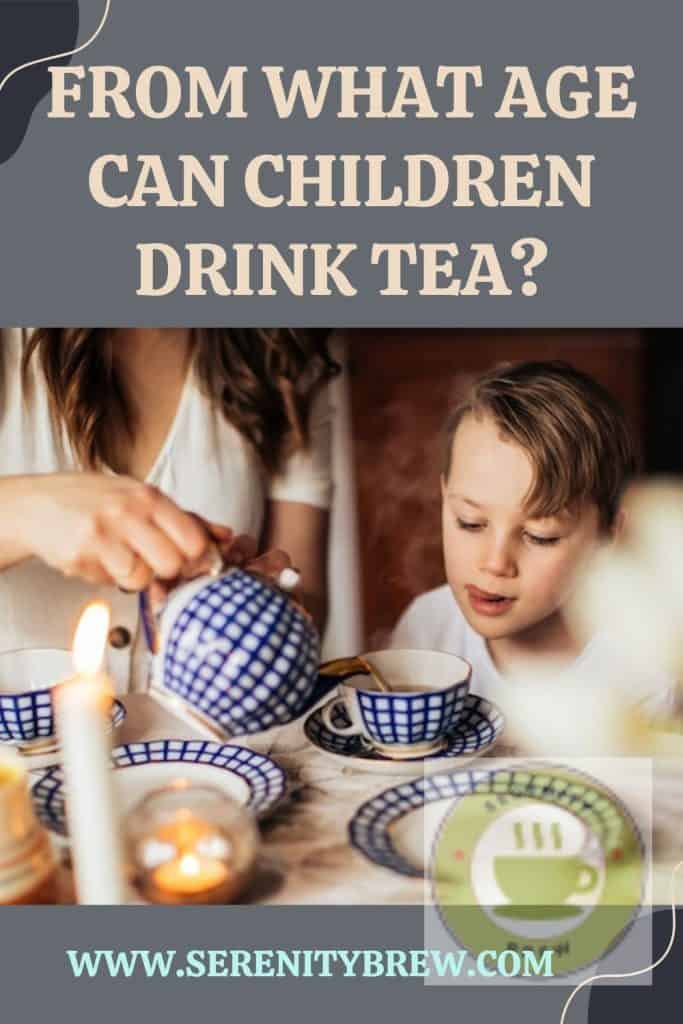
If you ask at a parents’ meeting at what age you can give tea to children, you will get the most varied answers. And the traditions will weigh heavily, even if they are not very healthy.
In parenting forums many topics are discussed from totally opposite angles. But there are few topics more discussed than the one related to giving tea to babies or children.
In Latin America it is very common for a relative to suggest giving a bottle of tea to the newborn baby “until the milk comes down.” Clearly and with all the supporting pediatric associations, we can tell you that this practice is NOT convenient. Tea can be very healthy for adults and also for children, but for a newborn the best is breast milk and water if there is a risk of dehydration (due to some pathology).
So never give a newborn tea, even if your grandmother recommends it.
Caffeine and flavonoids, the most discussed components for babies
We all know that a cup of tea has much less caffeine than a cup of coffee. But even so it has caffeine, which when we refer to tea we usually call it theine but it is the same substance.
In a baby, small amounts of caffeine can cause excitement, so giving tea to a young child is not advised.
In addition, they contain polyphenols that are great for us adults as antioxidants, but in children they can interfere with iron uptake. We know that this mineral is essential for child growth and its lack in young children can cause anemia. When children get older they incorporate foods that contain a lot of iron, so the contraindication of tea is no longer relevant, as long as they do not drink it with meals.
Before the age of 2, babies feel hungry by a different mechanism than adults. If they have a stomach full of any liquid, they will not drink breast milk or a bottle. That’s why if you give him tea or even water without a medical indication, you can cause him to drink less milk, which is what he really needs for his growth.
In other words, despite the fact that there are many discussions about the pros and cons of children drinking tea, pediatricians agree that children under 2 years of age should not drink tea.
Between 2 and 5 years:
Research suggests that decaffeinated herbal teas are a better choice in this age range. Herbal teas do not contain caffeine and the most recommended for this age are:
– Chamomile: for colic, as it is anti-inflammatory and antispasmodic
– Melisa: for children who have trouble sleeping or are overexcited.
– Mint: from stomach upset (irritable bowel, colic and nausea) and stress to nasal congestion and cough suppression, mint is also a recommended herb at this age. The infusion should be milder than the one you prepare for adults, since it is a strong flavor for a child who tries it for the first time.
These infusions are indicated in healthy children who do not have kidney or liver problems.
Although until decades ago it was common for mothers to give their infants an infusion of star anise for colic, currently pediatricians strictly advise NOT to give star anise infusions to babies or children. This is due to:
– It is very difficult to dose and a small excess causes serious neurological reactions such as seizures and heart problems.
– The real star anise ( Illicium verum ) is very scarce, so it is usually replaced by Japanese star anise , which is very poisonous .
Let’s play tea
In some cultures, such as the British, it is common for 3- or 4-year-olds to want to drink tea like their parents. It can also happen to you that when you are enjoying your tea, your little one wants to try it or that you serve him in his little tea set.
In these cases what you can do is prepare a “tea that is not tea”, or tea to play by heating water until lukewarm, the juice of half a lemon and 1 teaspoon of honey.
Between the ages of 5 and 9 (and after):
Once they are of school age, pediatricians consider it safe for children to drink tea. Even many educational institutions serve tea at snack time. But what tea and how much?
The most suitable tea for children of this age is unsweetened green tea, sweetened with Stevia.
This is because it is the least caffeinated tea and restricting sugar in children’s drinks is the best way to prevent cavities and excess weight in later life.
The World Health Organization establishes that the maximum amounts of caffeine that a child can take are:
– Between 5 and 9 years : 55 mg
– Between 10 and 14 years : 75 mg
Now let’s see how much caffeine some of the most popular drinks have:
| Drink | Caffeine (mg) |
| Filtered coffee (1 cup of 240 ml) | 95 |
| Energy drinks (240 ml) | up to 160 |
| Espresso coffee (30ml) | 47-64 |
| Black tea (1 cup of 240 ml) | 48 |
| Cola (1 can) | 40 |
| Green tea (1 cup of 240 ml) | 25-29 |
| dark chocolate bar | 30 |
With the certainty of not reaching the maximum amount of caffeine indicated by the WHO, we can then conclude that the amount of tea that children can safely drink is:
– Between 5 and 9 years : 1 cup of green tea per day
– Between 10 and 12 years : 2 cups of green tea per day
Advantages of children drinking tea:

In addition to the fact that the tea contains fluoride that strengthens tooth enamel, the real advantage of children drinking Stevia-sweetened tea is that it can be the perfect replacement for cola-type drinks or sugary juices to prevent childhood obesity .
In summer cold tea is great to keep children hydrated with a 100% healthy drink.
Carbonated drinks and artificial juices have acidic components that affect tooth enamel and, together with the sugar they contain, are major cavities producers in childhood.
Green tea or infusions sweetened with Stevia in children are a very good way to accustom the palate to natural flavors and avoid early contact with carbonated drinks with sugar that only constitute health risks and no benefits.
